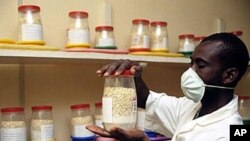A new study of sub-Saharan Africa finds serious shortcomings in the scientific research capabilities needed to improve the region's agricultural production. Rates of hunger in sub-Saharan Africa today are the highest in the world.
Addressing that hunger problem is complicated by a host of emerging issues, including food price volatility, growing population, water scarcity and climate change, says Nienke Beintema with the International Food Policy Research Institute. "There's more demand on better technologies or different technologies to address these issues."
Studies show investing in agricultural research and development is among the best ways for developing countries to reduce hunger and poverty.
So Beintema studied funding and staffing levels at 370 research institutes run by governments, universities, producer organizations or others in 32 African countries.
Good news, bad news
The good news is, research investment in sub-Saharan Africa increased by 20 percent overall from 2001 to 2008.
The bad news is, the increase took place mainly in just five countries: Ghana, Tanzania, Sudan, Uganda, and Nigeria. Spending actually declined in 13.
And Bientema says where spending increased, it often only served to make up for years of serious neglect.
In Nigeria, for example, which accounted for a third of the increase, Bientema says, "It's a positive sign because it is more commitment from the government. But Nigeria had extremely low levels of agricultural research funding. I was there for the first time in 2000 or 2001. And I visited institutes that could not function. They even didn't have a phone line, or they didn't have gas for the cars, one computer that didn't work."
National investments, donor funding
Nigeria currently has the region's largest agricultural research system. However, she says, a better measure is whether a country is investing at least one percent of the output of its agricultural sector on research. Only eight countries met that mark in 2008. Nigeria was not one of them.
Furthermore, Bientema says, most countries depend too much on funding from international donors. These funds
"are always very specific, focused on a certain area. And they are short term," she adds. "They are often 3, 4 or 5 years.
"And donors often don't have an exit strategy," Bientema adds. So when the funding ends, often times the research does, too.
Human resources
But funding is just part of the picture.
"Even if you put more money in it, there is still the issue of human capacity," she says.
Many countries did not hire new researchers for years because of budget constraints. Now, the lack of younger scientists is becoming a problem as older researchers approach retirement age.
For example, Bientema says, at Niger's leading agricultural research center, 60 percent of the researchers are at least 50 years old.
"And as retirement age in most countries is around 60, it means that within 10 years 60 percent are retiring," she says. "And these older researchers are often the ones with PhDs or master's degrees, with a lot of experience and knowledge."
Bientema says countries need to improve their higher education systems to produce more qualified researchers. And they need to invest more money in their national research systems -- and more of their own money, rather than depending on donor funds.
New commitment to agriculture?
After sharp spikes in food prices in 2007 and 2008, agriculture is higher on the priority list for foreign aid donors and for many African countries. Twenty-five countries have signed an agreement to commit at least 10 percent of their national budgets to agriculture.
But Bientema says it's too soon to say whether those commitments will translate into action. She points to two of the countries that have increased spending on agricultural research in recent years.
"With the new elections in Uganda, most of the government officials that were in support of science actually were not re-elected," she says. "So the question is, will this commitment continue? In Nigeria, they actually had a serious cut in the science budget. So, that shows you how commitments can change very quickly."
Beintema adds that the private sector may be able to step in when national governments cut spending. For example, she notes, producer cooperatives in some countries raise revenues from cash crops like cocoa, coffee or tea to fund research. In some cases, these funds can spill over into research into other important crops as well.




